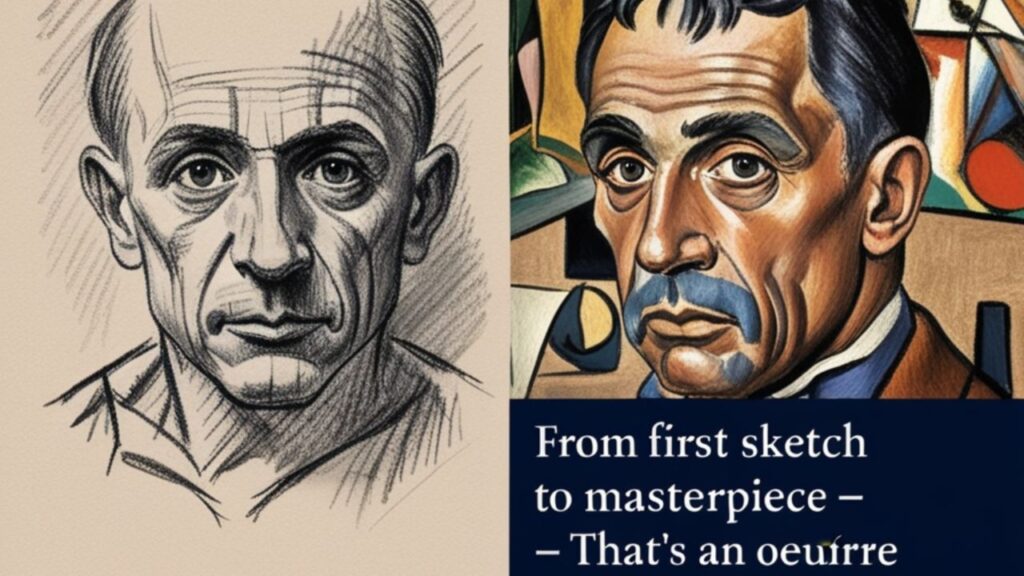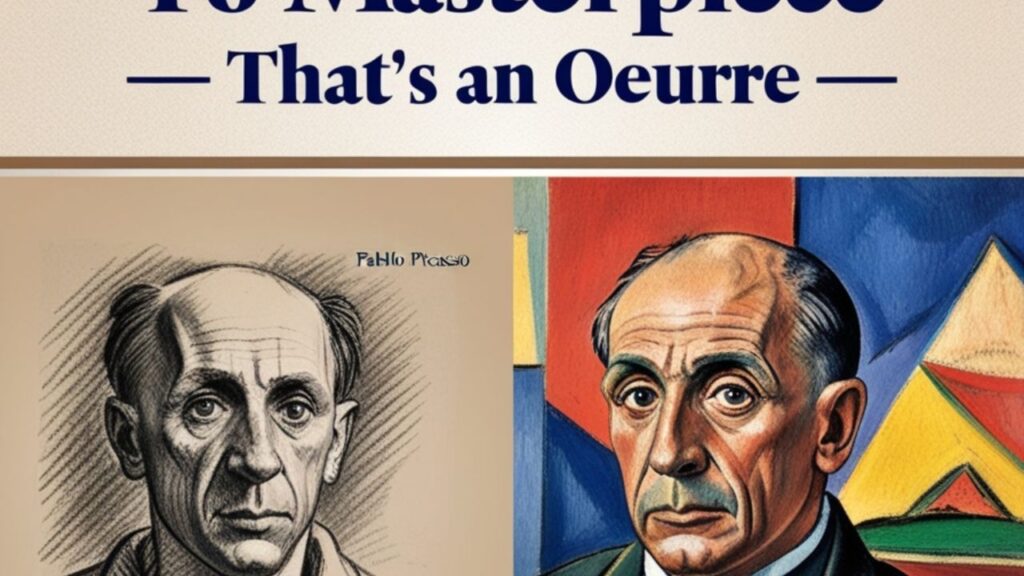The word oeuvre shows the full body of work of a writer, painter, or musician. It means everything they make during their life. From early drawings to famous creations, this word gathers all their efforts into one idea.
Artists often grow step by step, and their creative journey becomes clear when people study their oeuvre. It helps readers and viewers understand not just one painting or book, but the whole path of progress and imagination.
Sometimes, people compare a person’s oeuvre with a single masterpiece. The first word means everything they produce, while the second means their best work. This difference helps explain both their complete effort and their strongest creation.
What Does “Oeuvre” Mean in Modern English?
In modern English, oeuvre means the full creative work made by one person. It can be the writing of an author, the songs of a musician, or the paintings of an artist. This word collects everything they make in their career.
People use oeuvre to talk about an artist’s complete artistic output. It shows the progress from first simple works to later great pieces. The term helps explain the whole journey, not just one creation, making it useful for study and appreciation.
Oeuvre: Origins, Etymology & Evolution
The word oeuvre comes from Old French and Latin. In Latin, the word opera meant work or effort. Later, French kept this sense of meaning. English borrowed the word in the 1800s to describe the full work of creative people.
Over time, oeuvre became linked more with art, books, music, and films. It moved from meaning any type of work to showing artistic achievements. This change gave the word a special value, often used for culture, literature, and history.
Pronunciation of “Oeuvre” (US & UK)

In the UK, the word oeuvre is said like “UR-vruh.” The sound begins with a long “ur,” followed by a soft ending. This clear style helps students and speakers understand the word better when they read or use it in English.
In the US, people may say oeuvre as “OO-vruh” or “UH-vruh.” Both forms are correct and accepted. Knowing these pronunciation styles helps learners speak the word with confidence, whether in school, writing, or formal discussion about art and books.
| Dialect | IPA | Pronunciation Tip |
| UK | /ˈɜːv.rə/ | Sounds like “UR-vruh” |
| US | /ˈuːv.rə/ or /ˈʊv.rə/ | Think “OO-vruh” or “UH-vruh” |
Using “Oeuvre” in Sentences
- Picasso’s oeuvre includes thousands of paintings, drawings, and sculptures.
- Toni Morrison’s oeuvre shows powerful themes about culture and identity.
- Steven Spielberg’s oeuvre covers both films and early television work.
- Virginia Woolf’s oeuvre reflects changes in style and strong ideas.
- Beethoven’s oeuvre gives the world many symphonies, sonatas, and concertos.
See also : Which One Is You vs Which One Are You Explained
Real-World Examples of “Oeuvre”
| Source | Quote | Context |
| The New York Times | “The director’s oeuvre examines the isolation of modern life.” | Film criticism |
| The Guardian | “This novel stands out in her oeuvre for its bold structure.” | Literary analysis |
| Columbia Journal | “His entire oeuvre reveals a fascination with memory and time.” | Academic essay |
Synonyms and Near-Synonyms for “Oeuvre”
| Term | Ideal Context | Tone |
| oeuvre | Arts, lofty contexts | Sophisticated |
| corpus | Academic, scholarly | Formal |
| body of work | General use | Neutral |
| repertoire | Musicians, performers | Informative |
| portfolio | Artists/designers | Professional |
- Body of work – a simple way to show everything an artist created.
- Corpus – often used in schools or research for a writer’s complete texts.
- Repertoire – describes the full list of songs or pieces a performer can present.
- Portfolio – common for designers or painters to show their creative work.
- Catalogue – a record or list of creations, often in books or museums.
Oeuvre vs. Magnum Opus – What Sets Them Apart?
- Oeuvre means the complete body of work created by a person.
- Magnum opus means one greatest masterpiece made by that person.
- An oeuvre shows growth and style across many years.
- A magnum opus stands as the peak of creativity.
- Both words highlight art, but one covers all, the other just one.
| Term | Scope | Example |
| oeuvre | All creative output | Picasso’s 50+ styles |
| magnum opus | Single masterpiece | Les Demoiselles d’Avignon |
Critical Role of “Oeuvre” in Analysis
- An oeuvre helps show how an artist’s style changes over time.
- It highlights repeating themes across a creator’s artistic work.
- Studying an oeuvre gives insight into cultural and historical influence.
- It supports deeper literary and artistic analysis in schools and research.
- Looking at the full creative journey explains both strengths and growth.
Case Study: Virginia Woolf’s Oeuvre
The oeuvre of Virginia Woolf shows her strong ideas about life and society. Her books include themes of identity, time, and memory. Each part of her literary work gives readers a chance to see how her thoughts and style developed.
Her artistic contribution shaped modern writing in powerful ways. Stories like Mrs. Dalloway and To the Lighthouse reflect deep feelings and new styles of storytelling. This body of work helps students and critics understand her role in English literature.
Common Confusions & Misuse to Avoid

- Don’t use oeuvre to describe only one single work.
- Avoid mixing oeuvre with opera or opus, which have different meanings.
- Mispronouncing the word weakens clear communication.
- Using it too often in casual talk may sound pretentious.
- Keep the word for full creative output, not small projects.
See also : Is Yupper a Word? Meaning & Usage Explained
Final Thoughts
The word oeuvre is useful for talking about the complete creative work of an artist, writer, or musician. It gives a clear way to describe everything they made, showing growth, skill, and style across their whole career.
When people use oeuvre, they point to more than a single masterpiece. They show the entire artistic journey that shaped a creator’s life. This makes the word important for study, discussion, and appreciation in schools, books, and cultural talks.
- Oeuvre shows the complete creative work of an artist or writer.
- It helps people understand growth and change in style.
- The term adds depth to cultural and literary analysis.
- Using it carefully avoids confusion and misuse.
- An oeuvre celebrates the full artistic journey, not just one piece.
Bonus: Quick Reference Table
| Feature | Oeuvre |
| Etymology | Old French → Latin opera |
| Pronunciation | UK: /ˈɜːv.rə/ • US: /ˈuːv.rə/ |
| Meaning | Complete creative body by an individual |
| Fields | Art, literature, film, music, design |
| Synonyms | Corpus, portfolio, repertoire, body of work |
| Contrast | Magnum opus (greatest single work) |
FAQs About “Oeuvre”
What Word Is a Synonym for Oeuvre?
A synonym for oeuvre is work, especially when describing an artist’s complete body of creations, such as novels, paintings, or musical compositions.
What Is the Literal Meaning of Oeuvre?
The literal meaning of oeuvre is work in French. In English, it usually refers to an artist’s or writer’s complete creative output.
How Do You Pronounce Oeuvre in American?
In American English, oeuvre is pronounced as /ˈuːvrə/, sounding like “oo-vruh,” with emphasis on the first syllable.
What Is a Synonym for D Oeuvres?
A synonym for d’oeuvres is appetizers or starters, small dishes served before the main course at meals, parties, or formal gatherings.

Join Bibcia on a journey to master English grammar. Discover easy lessons, writing tips, and practical examples designed to make learning grammar simple and effective.










